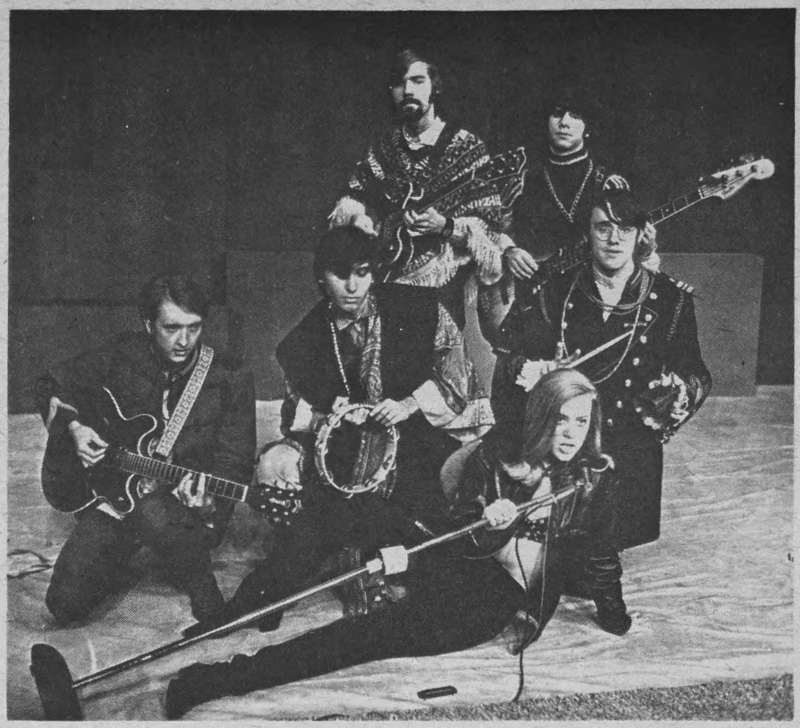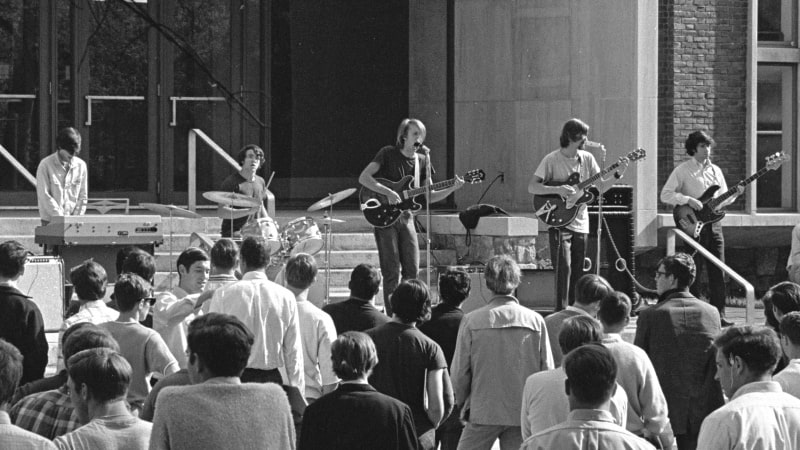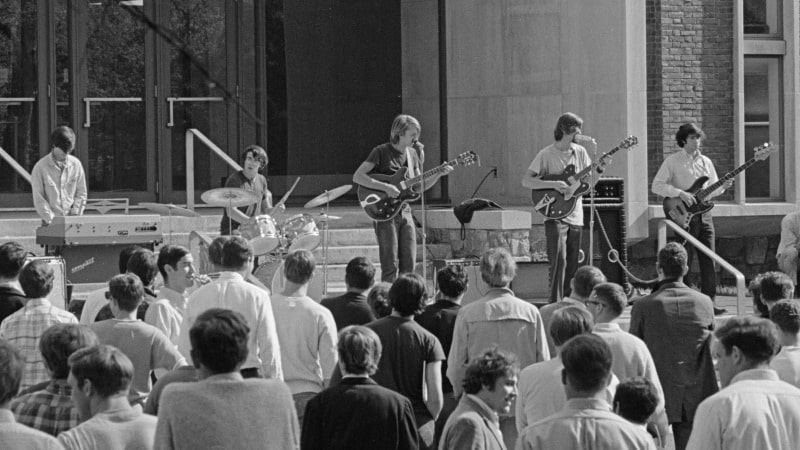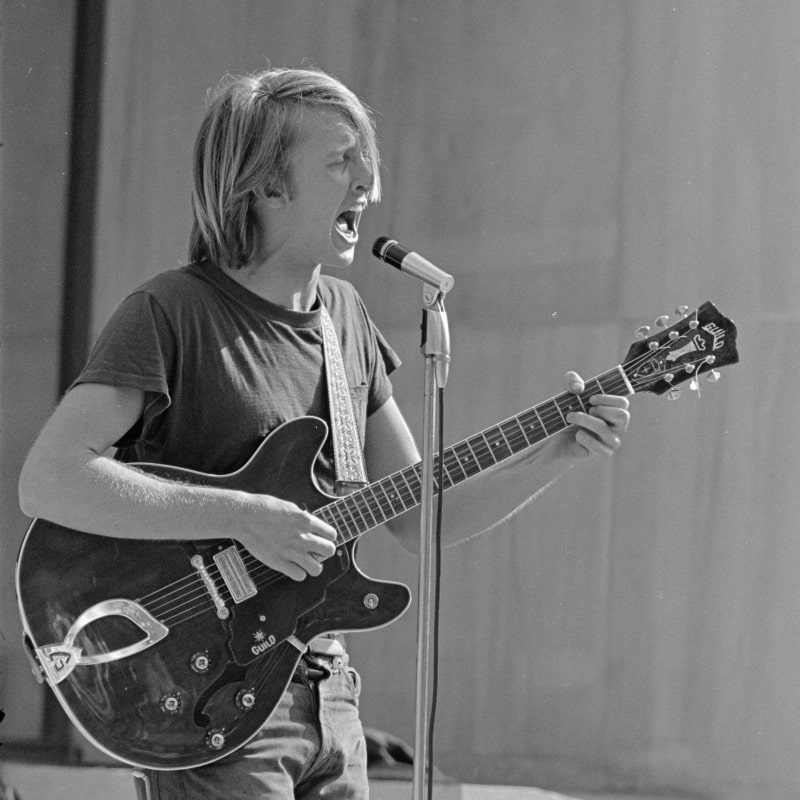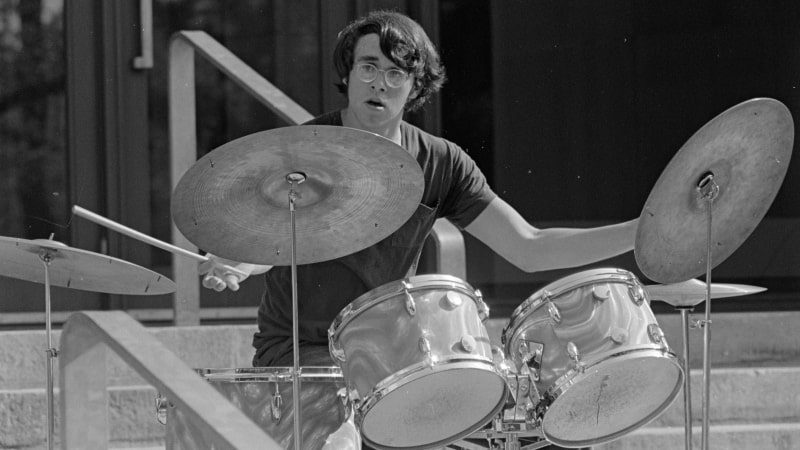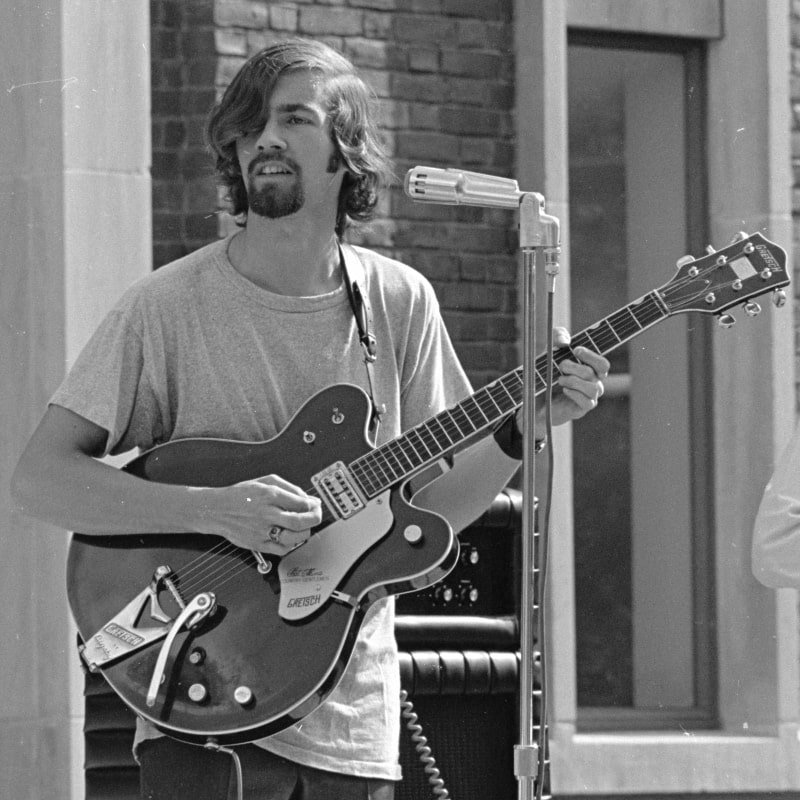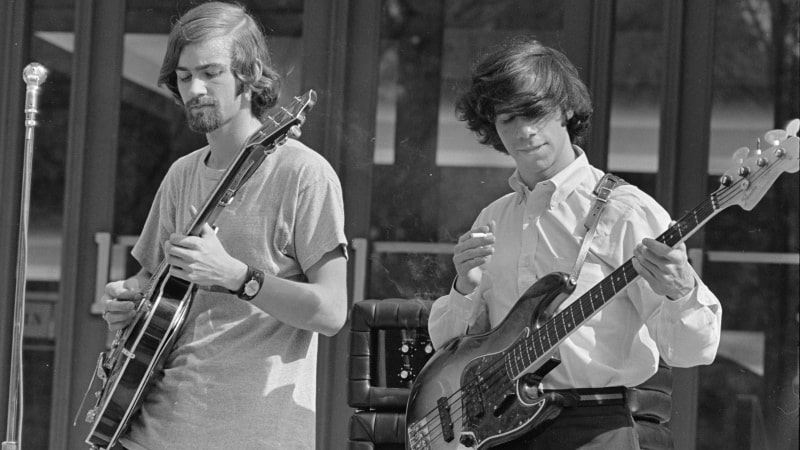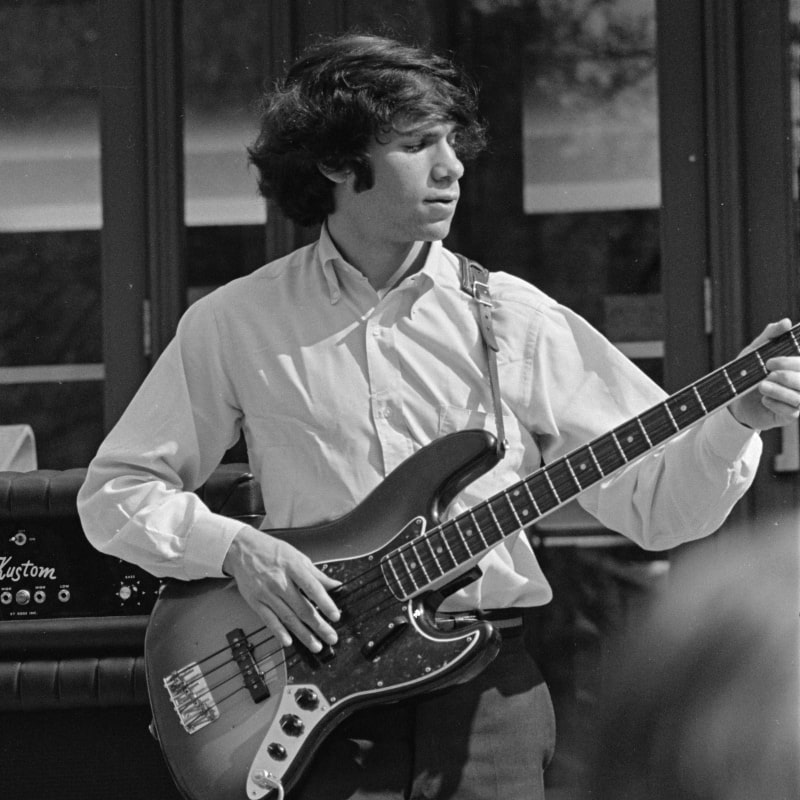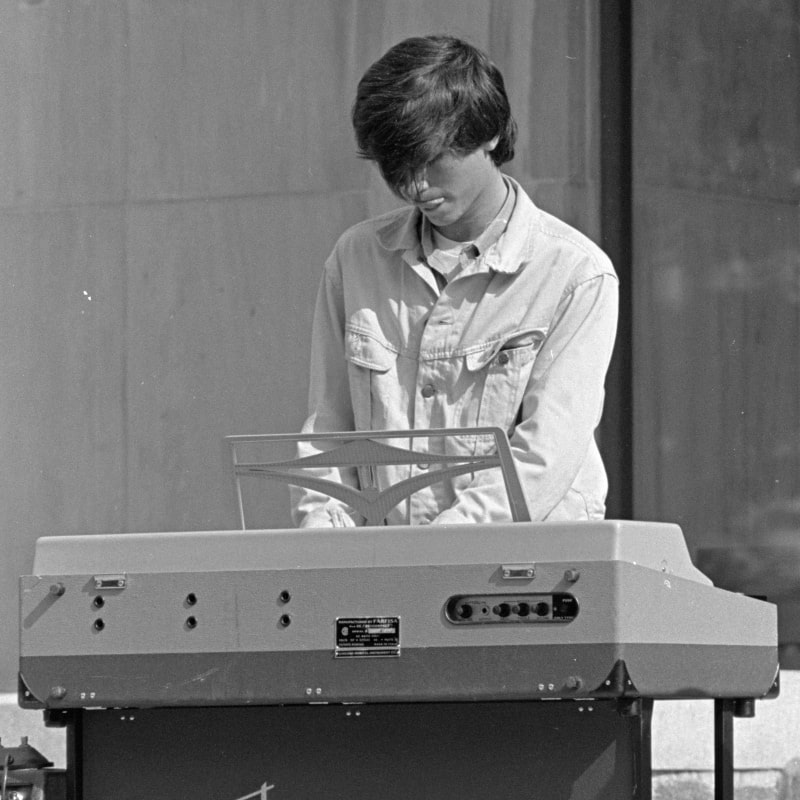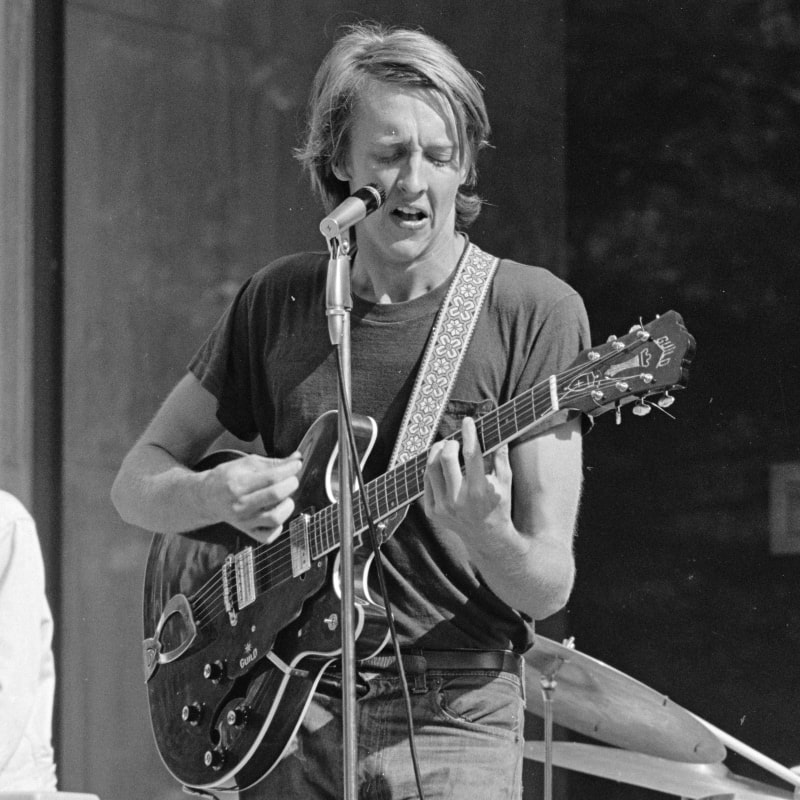(Note : Because the use of rock music in theatre is still in the experimental stage, and because this Brecht production is the first use of rock for drama at Amherst College, the following review 'is presented in an attempt to clarify and explore just how effectively musk was used within the dramatic structure.)
"A Man's A Man" begins with a frenetic Broadway-style fan-fare played by "The Leaves of Grass," an
Amherst rock band called "five magnificent musical clowns" by the Springfield Daily News.
It is followed by John Anderson playing a harmonica solo, a series of chord variations reminiscent
of the Vanilla Fudge's "You Keep Me Hanging On," Jim Steinman singing part of a rock-oratorio,
"Mr. Blue," a crowd-rousing erotic drum solo by Craig McNeer, and an abrupt finish with a circus
calliope sound.
The overture is varied and aggressive; it sets the tone of the music which helps make an otherwise
good play into a hypnotic evening of dynamic entertainment.
At first, we get a driving vocal by Jim Steinman of "Is There Anybody Here?" The soldiers are brought
from the audience with great glee. The music counters this with the drama and passion of Steinman's
singing. Throughout the play, the music is to serve this function frequently: the creation of
conflicting moods.
An adapted, mocked "Ballad of the Green Berets" follows. The power of the soldiers' voices, the hard
guitar of Jeffrey Southworth, and the bitterness of the lyrics are emotionally disturbing as a total
force.
By the time an adapted version of Phil Ochs' "Cops of the World" rolls around a little later, the
anti-war theme has been driven home. The unrelenting bass guitar, superbly played by Rick Weinhaus,
is at times more moving than Och's own version. The song is sheer instrumental and vocal power.
•
But the "Leaves" have just begun to fight. Sarah Harris appears next singing "The Song of the
Travelling Bar." Miss Harris gyrates constantly to the smoky rhythm, doing little else to put the
song across. I can't compare her to Lotte Lenya, as did the Springfield Daily News,
but her voice is right in place. The music is mellow, Steinman on organ creating a Nina Simone-type
arrangement. Again the driving beat, the smooth music. Again the contrast between lyrics and music.
Then, at the end of the scene, the best number in the show, "The Song of the Ganges River."
A simply beautiful song. Beginning with a cheerily snide introduction sung by Miss Harris, the music
gets louder, there is a break, and suddenly a switch. All hell breaks loose as Miss Harris begins to
belt : "Take a look at the Ganges River..." I felt like standing up and yelling "Bravo!!" even though
the occasion wasn't quite right. Miss Harris displays the best of her vocal equipment and pours out
the theme a second time, displaying talent we knew was there, but hadn't yet seen. The number is
emotional rape; it is enthralling.
•
Throughout the rest of the play, the theme "A Man's A Man" recurs frequently sung by different
characters. There's a Motown version with Sarah Harris and her women-for-hire as the back-up group,
a 1956 rock version complete with falsetto "doo-bee-doos" by Laurie Alberts and bass "doo-wahs"
by Drew Kalter, and an Everly Brothers duet by Hugh Lawrence and Toby Webb.
The theme is also done by Brock Putnam and Craig Dunkerley in bolero style, a strip number by Widow
Begbick's girls, and a drunken version by Bill Hart. Webb and Lawrence were great, Begbick's girls
were terrible, and the Kalter-Alberts satire was excellent. By the end of the play, however, the
theme has been heard so often it begins to wear thin.
David Stewart's voice is an absolute pleasure, later in the second act. His "Song of the Both,"
one of the highlights of the evening, is sung to the time of, yes, it's for real, the early 50's
Chordettes' hit "Mr. Sandman (Bring me a Dream)."
The lyrics are vaguely unbelievable, but Stewart manages to make them sound reasonable, and the music
is fine. He is excellent, doing one of the best jobs of using more than just a voice to project a song.
The final number would warm David Merrick's heart. The entire cast lines up as Stewart sings a new
introduction to the "Recruiting Song," from the opening of the play, and they all join in singing the
new "Green Berets," kicking their legs in a Ziegfield chorus line. Hysterical, and yet not so funny.
The song is not a happy one, and yet there are thirty people singing like it was the Meredith Wilson
dexedrinal song of all times. Again the contrast. Again the harshness.
•
The music is not without its bad moments. Widow Begbick's girls could have been dispensed with
altogether. The volume could have been turned town. We could have enjoyed the theme without hearing it
so many times. But mostly it was superb. It is a conglomerate of rock, hard-driving blues, pure
Jim Steinman, and Broadway clap. Take your pick, they're all there at one time or another.
The score is always appropriate, and more important, it does not merely compliment the play. It is
integral to it. It creates moods, makes points often better than the dialogue. It is sung well. It is
explosive.
Go see the play. year the music. It is an experience in musical theatre which should not be missed,
and a chance to hear the "Leaves of Grass" at their best.
Source: Amherst Student archives
